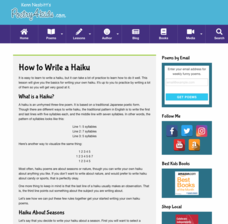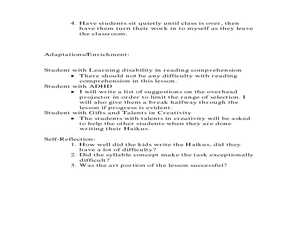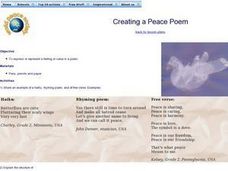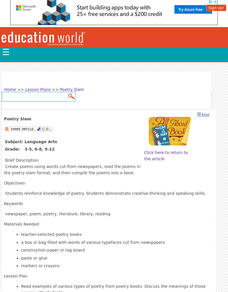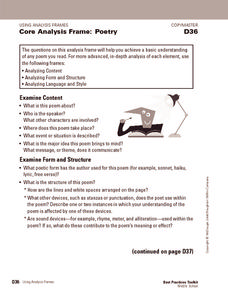Curated OER
Spring into Poetry
How many different types of poetry are there? Let me count them; list poems, haiku, and makes-me-think poems are only a few. Learners create their own poems accompanied by artistic projects such as haiku poems written on kites.
Teacher's Corner
Haiku
The haiku, one of the most popular fixed forms, is the subject of this writing activity, the seventh in a series of ten poetry exercises.
Poetry4kids
How to Write a Haiku
A haiku is the focus of an activity that challenges scholars to draft an original poem. Authors discover the origin and components of a haiku, read three example poems, then follow six steps to compose their own.
Poetry4kids
How to Start a Poetry Journal
Practice makes proficient! Using a journal of their choice, authors organize pages, then begin their writing journey of on-going writing practice in which they compose all poetic forms including diamante, limerick, free verse, and more!
Curated OER
Haiku Poems
Eighth graders study haiku poems. In this poetry instructional activity, 8th graders write two haikus containing the standard 5-7-5 syllables content about things they enjoy within nature.
Curated OER
Oceans-A Fact Haiku
Learners create haiku poems. In this poetry lesson, students listen to the sound of the ocean from an audio file and write a haiku poem about oceans.
Poetry4kids
How to Write a Tanka Poem
Take your haikus to the next level with tanka poems, another form of Japanese poetry that regulates the length and rhythm of each line by syllables. Young writers read the explanation, examples, and tips for tanka poems before writing...
National Endowment for the Humanities
The World of Haiku
Students complete a study of Japanese culture through haiku. They read and interpret haiku poetry and write haiku of their own.
PBS
Exploring Selected Haiku by Issa
If your class doesn't know what a haiku is, show them two examples from the Japanese poet Issa (both included here), and have them make some observations. How long are they? What is the structure? A video and a list of questions help...
Curated OER
Can You Haiku?
Everyone loves haikus! They're short, quick, and fun to write! Analyze the rules and conventions of haiku. Readers interpret examples of haiku and develop a vocabulary for writing haiku. Then they compose a haiku based on a personal...
Curated OER
Haiku and Cinquain
As you introduce your scholars to haiku and cinquain poetry, give them plenty of opportunity to practice. This brief instructional activity gives an example of each, then scaffolds the syllable breakdowns for writers to create two poems...
Curated OER
Breaking up a Poem
Complete with a SMART board presentation and all necessary materials, this lesson plan guides seventh graders through the process of writing poems and utilizing line breaks. After reading through the presentation and different examples,...
Curated OER
Nurture Poetry
Learners create a poetry book. In this poetry lesson, students write a cinquain poem, name poem, haiku, limerick, and preposition poem.
Curated OER
Creating a Peace Poem
Second graders write a poem using words from a list and practice poetic forms. In this lesson on writing a peace poem, 2nd graders brainstorm words or phrases associated with "peace." Students choose a poetic form to express their...
Curated OER
Poetry Slam!
Create poems without writing! Young poets create poems using words cut from newspapers, read their poems aloud, and compile them in a book. This lesson plan allows the teacher to view each learner's creative process and assess their...
Houghton Mifflin Harcourt
Core Analysis Frame: Poetry
Dig deep into any piece of poetry with a set of analysis questions. Ponder the content, form, and language of poetry and provide some question for critique. The first two pages include general questions, and the remainder of the document...
Curated OER
Japanese Poetry: Tanka? You're Welcome!
Students explore tanka, a form of Japanese poetry. They read and analyze tankas to determine the structure and intent, and compose a traditional and a non-traditional tanka.
Denver Art Museum
Descriptive Haiku
Even though this is technically an art lesson, haiku poetry is actually the main focus! Learners view photographs of Japanese tea caddies. They list five descriptive words for the caddies, then write haiku poems using the caddies as...
Curated OER
Everyone Can Write Poetry
Embark on a journey of writing several different types of poetry. Fifth graders read several examples, and use the examples to model their own writing. Each poem is to be accompanied by a different art visual representation. In the end,...
Curated OER
Be the Poet
Students work through a Haiku Organizer to determine the characteristics they use to write eight haiku poems on a theme that they choose. They design presentation folders of their completed work.
Curated OER
What is a Haiku? How Do You Write a Haiku?
Haiku poetry is explored in this language arts lesson. Yong readers identify the characteristics of haiku and read several examples. Students make connections between their study of Japan and the poetic form of haiku, and they write...
Curated OER
Poetry: The Most Compact Form of Literature
Introducing or need to review literary devices and terms for a study of poetry? Though text heavy, the explanations and examples of key poetic devices will provide learners with the vocabulary they need to discuss and craft poems.
Curated OER
Personal Poetry Books
Students work in the classroom and in the computer lab to produce a Personal Poetry Book.
Curated OER
Haiku Poetry
Third graders write their own haiku poem after a lesson on the history and format of a haiku. In this poetry lesson plan, 3rd graders write a haiku with the correct lines and symbols.




